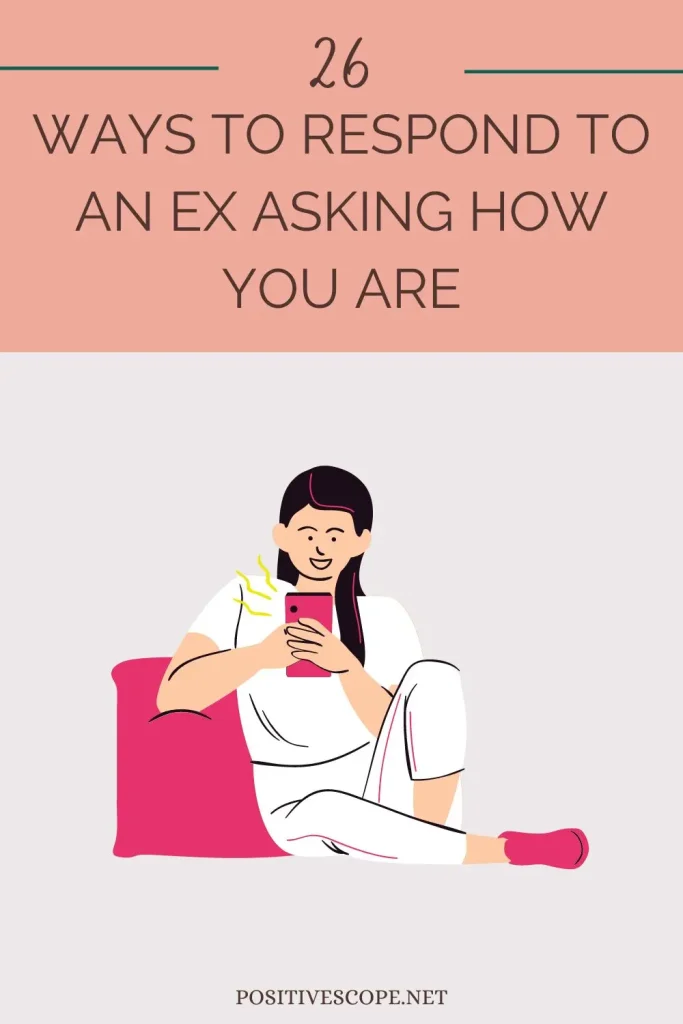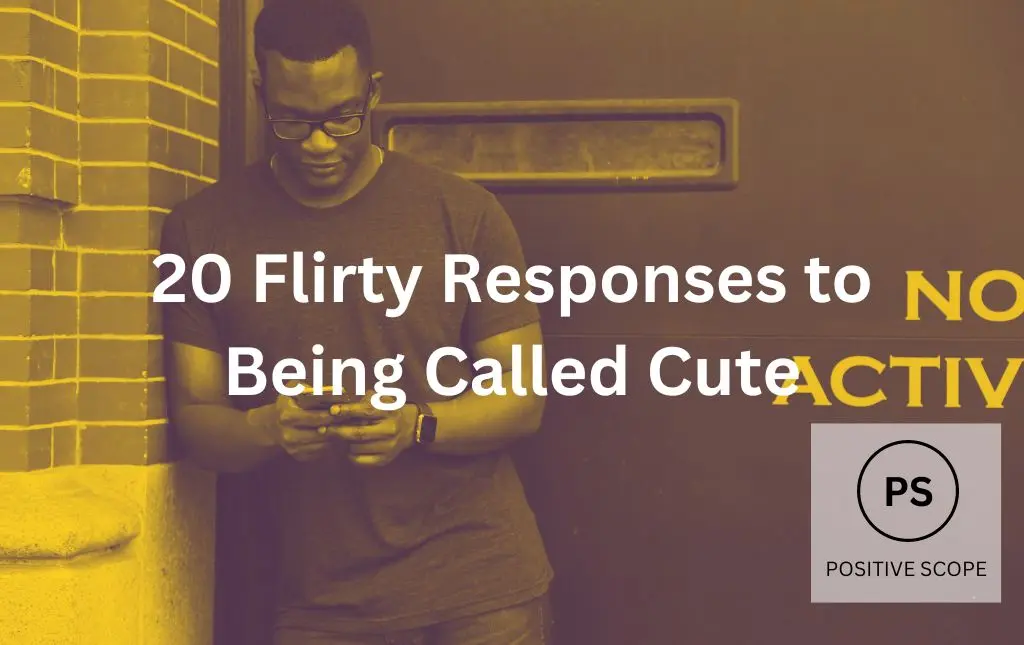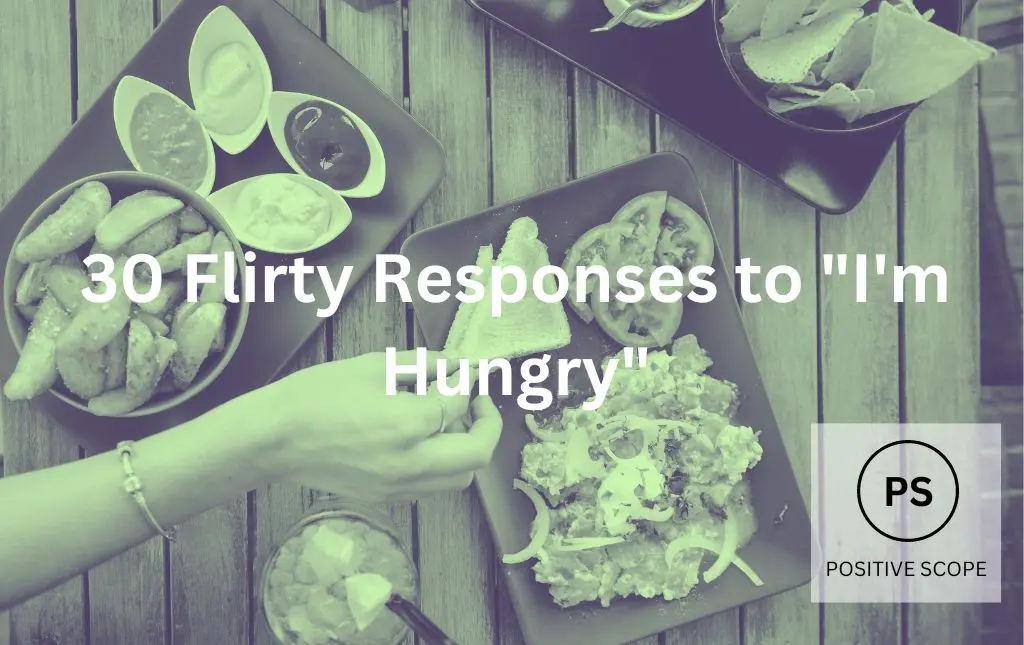26 Responses to an Ex Asking How You Are
Breakups can be tough, and even tougher when your ex reaches out to check up on you. When you receive a message from an ex asking how you are, it’s natural to feel mixed emotions.
While part of you may want to ignore the message, responding in a polite and mature way can help close that chapter of your life on good terms.
Here are some tips for responding to an ex who’s checking in on you, without opening up old wounds or reigniting any unresolved feelings.
26 Ways to respond to an ex asking how you are
1. I’m okay. I’ve been very busy with work recently. What about you?
2. Hello. Thanks for reaching out. I’m doing okay, just keeping myself busy and working on personal growth. How about you?
3. Hi. It’s nice to hear from you. I’m doing alright, just trying to stay focused and positive. How’s life been treating you?
4. Hi! I’m delighted to see your name on my screen. I’m fine, thanks. How are you?
5. Hi, [Insert name], been struggling lately, how about you?
6. It’s been tough lately, but I’m hanging in there.
7. I’m happy and moving on with my life
Read on: Flirty Responses to “I Want You” Over Text
Responses to your ex if you Want to end the Conversation
One approach to responding to an ex asking how you are is to keep it short, while also indicating that you don’t really want to continue the conversation. Here are some examples:
8. I’m doing okay, but I’m not really in a place where I want to talk right now.
9. I’m not interested in talking to you. Please respect my boundaries.
10. I’m sorry, but I don’t think this is appropriate. I already told you I don’t want to keep talking to you.
11. Thanks for checking in, but I need some space to focus on myself right now.
12. I’m doing okay, but I don’t think it’s a good idea for us to have a contact at the moment.
13. Honestly, I’m not ready to talk yet. It’s nothing personal, I just need some time to heal.
14. It’s nice of you to ask, but I’d prefer not to have any communication right now.
Read on: He Always Answers My Calls But Never Calls Me
Responses to an Ex Asking How You Are if you want to be friends
Sometimes a relationship with an ex can transition into a friendship. If that’s what you’re looking for, here are some possible responses:
15. Thanks for asking! I’m doing well and would love to catch up sometime.
16. I’m glad you reached out. I’m open to being friends if you are.
17. Thanks for checking in. It would be great to grab a coffee and catch up sometime.
18. I’m doing well, thank you. It’s nice to hear from you and I’m glad we can still keep in touch as friends.
19. Hi! It’s nice to hear from you. How are you?
20. I’m doing great! How have things been going for you?
21. That’s so sweet of you to ask! I’ve been keeping busy with. What have you been up to lately?
22. Doing fine, wbu? so glad you reached out. Would love it if we could be friends.

Responses to an Ex Asking How You Are if you want to get back together
There is nothing more complicated than navigating a relationship with an ex, especially if you still have feelings for them. It can be tempting to jump right back into things and try to rekindle what was lost, but it’s important to approach the situation carefully and thoughtfully.
23. Thanks for asking, I’m doing pretty well actually. It’s funny, every time I hear from you it brings back so many good memories. How about you?
24. Hi! [INSERT NAME]. tbh I wasn’t expecting to hear from you. Doing well, thanks. How have you been?
25. If you’re considering getting back together with an ex, it’s important to take things slow and assess whether or not it’s the right decision. Here are some possible responses to an ex asking how you are if you want to get back together:
26. Hey there! I’m doing pretty well, thanks for asking. How have you been? It’s been a while since we talked.
Read on: Flirty Responses to How’s it Going
Things to keep in mind when responding to an Ex
1. Keep it short and polite: If you’re not sure how to respond to your ex’s message, a simple “Thanks for asking, I’m doing okay” can suffice. Keep the response short and sweet, without going into too much detail.
2. Be honest: If you’re genuinely struggling after the breakup, it’s okay to be honest about it. But keep in mind that you don’t owe your ex any explanations or justifications. You can simply say, “I’m still going through a difficult time, but I appreciate your concern.”
3. Set boundaries: If you feel like your ex is trying to pry into your personal life or emotions, it’s important to set healthy boundaries. You can politely decline to answer certain questions or redirect the conversation towards neutral topics.
4. Take time to respond: It’s important to take the time you need to process your emotions and thoughts before responding to your ex’s message. Don’t feel obligated to respond right away, especially if it will cause a rush of negative emotions or mind games.
5. Consider the relationship dynamic: Depending on the nature of your past relationship with your ex, it may be best to avoid contact altogether. If the relationship was unhealthy, abusive, or had hidden agendas, responding to their message may lead you down a rabbit hole of unresolved issues and negative emotions.
6. Focus on the present: Instead of dwelling on the past or getting caught up in what could have been, focus on your current situation and how you’re moving forward.
You can let your ex know that you’re focused on the present and appreciate their concern, but you prefer to keep the conversation focused on positive things happening in your life right now.
7. Use the no-contact rule: If you’re finding it difficult to move on from the relationship, consider implementing a no-contact rule.
This means avoiding all communication with your ex for a period of time until you feel emotionally ready to engage with them again.
It’s important to remember that responding to an ex asking how you are doesn’t necessarily mean you’re obligated to engage with them further. It’s okay to keep the conversation short and cordial, without delving into your personal life or emotions.
If you’re co-parenting with your ex, it may be necessary to communicate about parenting time and other logistical matters. In this case, it’s important to keep the conversation focused solely on those practical matters, without getting into any personal or emotional issues from the past.
How to Respond to an Ex Checking In: Tips and Factors to Consider
When an ex reaches out and asks how you are, it can be a challenging situation to navigate. Here are some tips for crafting your response while keeping your well-being in mind:
Consider Your Relationship Dynamic and Mental State
- Depending on the nature of your past relationship with your ex and your current mental state, how you respond may vary.
- Aim to maintain healthy boundaries while also approaching the situation with caution if necessary.
- If the relationship was unhealthy or abusive, prioritize your safety and seek professional help.
Prioritize Your Recovery Process
- Remember that your mental health should always come first, so don’t feel pressured to respond if it doesn’t feel right just yet.
- Take time to process your emotions before responding so that you can ensure that you’re comfortable with what you’re saying.
Keep it Simple and Polite
- Avoid getting into a rabbit hole of emotions or engaging in mind games with your ex.
- Instead, keep your response short, polite, and focused on the present moment.
- Don’t reveal too much personal information; aim for a responsive text message that acknowledges their concern without divulging too much.
Be Mindful of Any Hidden Agendas
- Be aware of any ulterior motives that your ex may have for reaching out.
- If they’re trying to reconnect or manipulate you, remember to stay true to your own boundaries and priorities.
Final Thoughts
In conclusion, responding to an ex asking how you are can be a tricky situation, but with some thought and consideration, it can be handled in a healthy and positive way.
Remember to prioritize your own well-being and safety, set healthy boundaries, and avoid getting caught up in any emotional games or manipulation.
Keep your response short, polite, and focused on the present, without delving into any personal or emotional issues from the past.
And remember, it’s okay to take some time to process your emotions and respond when you feel ready.
Trust yourself and your instincts, and seek professional help or support from trusted friends and family members if needed.





